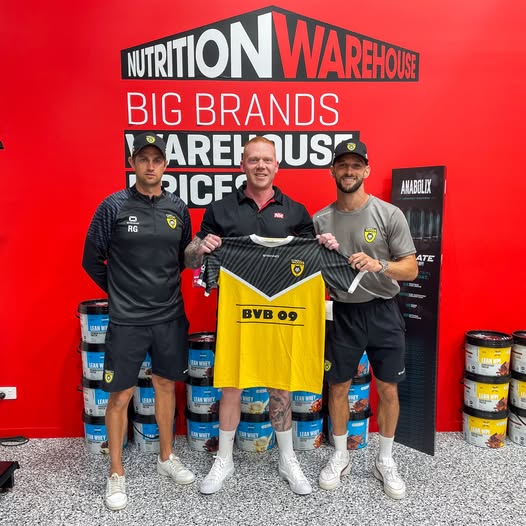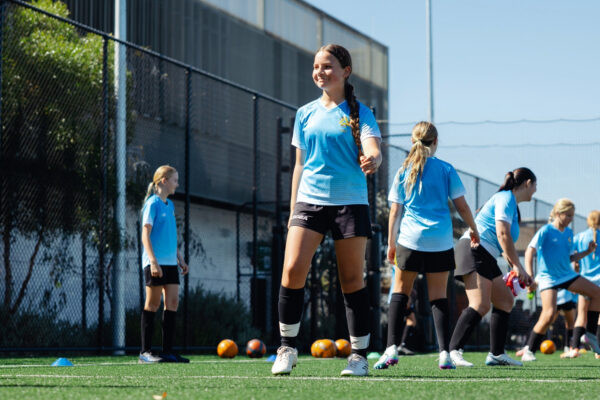Read here for a summary of all the NPL partnerships that have been announced this week.
NPL VIC:
Heidelberg:
Prime Plastic Bags (recommitted partner) – a high-quality plastic bag manufacturer and supplier based in Reservoir. The partnership between Prime Plastic Bags and Heidelberg United has remained strong since its beginnings 13 years ago.
George Cross FC:
Neo Finance (recommitted partner) – Offering financial services to help executives, small businesses and franchise owners get the equipment they need to improve their business. They aid in car financing, equipment, trucks, light commercial vehicles, air & refrigeration and energy solutions.
The Australian Meat Company (recommitted partner) – A leading meat supplier in Victoria, offering a range of options to its clients along with recipes to help customers even after the food is delivered.
Crash Technology (recommitted partner) – An IT support and services company based in Gladstone Park, Victoria. They have served the Australian SMB industry for over two decades, offering tailored solutions to a range of clients.
Finley Finance (recommitted partner) – Based in Victoria, Finley Finance provides financial support to its clients, helping them through car loans, motorbike loans, personal loans, or credit issues.
Kerakoll (recommitted partner) – A multinational construction company born in Sassuolo, Italy. It focusses on Installation, Construction, Surfaces and Services.
Mark Avellino Photography (recommitted partner) – Melbourne-based photographer offering excellent services across events, portraits, sport and commercial projects.
Del-Re National (recommitted partner) – One of Victoria’s leading foodservice providers, supporting restaurants, cafes, bars and pubs with reliable and quality service.
DEKA (recommitted partner) – Fitness testing and competition group, offering athletes of all levels the chance to push their limits and achieve their fitness goals.
Vinage Customs (recommitted partner) – Australia’s signage specialists based in Tullamarine. They offer a wide range of services including designing, printing, wrapping, fabricating and installing.
Toni Tenaglia Media (recommitted partner) – Toni Tenaglia is a radio announcer on Melbourne’s Gold 104.3 and Sydney’s Gold 101.7, as well as a podcaster and avid football fan.
Vehicle Compliance Services (recommitted partner) – a registered and approved VASS signatory to VicRoads, ensuring that their clients can drive safely on Australian roads. They help any vehicle modifcations adhere to engineering and safety regulations.
McDonald’s Caroline Springs (recommitted partner) – long-running fast-food restaurant renowned for its burgers and fries.
Glenstock Homes (recommitted partner) – a family-owned business since 1996, Glenstock Homes is dedicated to constructing high-quality homes for its clients.
O’Brien Accountants & Advisors – a full-service accounting and financial planning firm based in Ivanhoe. Since 1976, its high-quality financial services have been built on values of innovation, collaboration, accountability and respect.
NPL Northern NSW
Belmont Swansea Utd:
Next Level Tree Services (recommitted partner) – A highly-experienced team offering services including tree removal and tree pruning, as well as outdoor property maintenance and bushfire mitigation.
NPL QLD:
Gold Coast United FC:
Fiona Watson Recruitment – A specialist recruitment service founded on the Gold Coast in 2014. They are a trusted and respected recruitment service who specialise in accounting, construction and marketing. They will partner with the 2026 Women’s Program.
Burleigh Brewing – Popular brewery and taphouse who pride themselves on providng expertly crafted beer, made from local products.
YoMG – Australian eatery chain founded in Melbourne in 2013. It is renowned for serving burgers, shakes and frozen yoghurt, standing as a popular eatery across the country.
Brisbane City:
Mainfreight – An international supply chain provider helping businesses move their products across air and ocean, offering solutions in warehousing and transport.
Place Newmarket (recommitted partner) – Delivering premium services in real estate, Place Newmarket is known for professionalism and expertise across buying, selling and managing properties in Brisbane.
NPL SA:
Campbell Town City:
Euro Appliances – Established in 2002, Euro Appliances takes pride in providing high-quality products and services for clients seeking stylish, Italian-inspired kitchen appliances.
All Nu Foods – Food service distributors whose fundamental mantra is ‘quality is paramount’. Their team has over 100 years combined of industry experience, and are family-owned in South Australia.
Jarvis Ford – Ford dealership based in Adelaide for over 40 years. They offer state-of-the-art showrooms along with expert after-sales services to give their customers a smooth experience when choosing their new car.
Reality Furniture – Based in Adelaide, Reality Furniture offer bespoke, hand-crafted furniture designs for commercial and residental interiors.
Tony & Mark’s – A fruit & veg shop with a strong presence in South Australia since 1978. For over 45 years, they have provided locals with the finest produce, including a Service Deli and Cheese Bar.
Piotto By Design – An elegant home and residential property designer, dedicated to balancing excellence and simplicity for its clients.
Climat Air Conditioning & Solar (recommitted partner) – A supplier of home heating and cooling systems, offering a wide selection of leading Australian brands with the latest technology and reliability.
Davroe (recommitted partner) – A hair-product brand which specializes in 100% vegan and Australian-made products.
Carl’s Jr – Fast-food chain specializing in burgers made from 100% Australian meat.
Chemist King (recommitted partner) – Launched in 2008, Chemist King offers pharmacy, health and beauty products to its customers at affordable prices.
NE metrostars:
TJ Goalkeeping – Goalkeeper glove company in Adelaide, owned and operated by former young Socceroos keeper, Anthony Tassie Breaden. They offer affordable products for local interstate players up to A-League professionals.
NPL TAS:
Launceston City FC:
Automotive IQ – Based in Kingsmeadows, they offer clients services across diagnostics, servicing and repairs for all makes and models.
NPL WA:
Olympic Kingsway:
New Balance/Belgravia Apparel – Belgravia Apparel are a custom apparel supplier based in Australia. With extensive teams across Australia and New Zealand, they have partnered with New Balance since 2020 to supply the Australiasian sports market with high-quality kits and apparel.
Perth Red Star:
First Kick – A childcare sport program provider aiming to create a fun and engaging environment to foster healthy children through football sessions. They cater for young footballers from 2-12 years-old, led by highly-qualified and dedicated coaches.




















